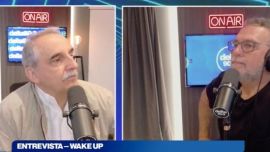President Javier Milei wielded US hundred-dollar bills with his face on them during the election campaign, but Argentines suddenly need pesos more than ever thanks to his economic plan.
More people are now selling some of their dollar savings for pesos to make ends meet than those buying greenbacks. The abrupt revival of demand for the crisis-prone currency is an unexpected consequence of the shock-therapy policies Milei implemented after taking office on December 10.
Some 208,000 Argentines sold foreign currency through official channels in April, according to Central Bank data released Friday, while 51,000 bought dollars or other hard currencies. That builds on a trend that started in January and marks the first reversal of buyers and sellers since at least 2018.
In November, the month before Milei’s inauguration, 789,000 Argentines bought hard currency while only 114,000 sold dollars. The figures are only a sliver of the real snapshot, since millions of Argentines exchange pesos and dollars on the vast black market, as well as through legal financial transactions.
The need for pesos stems from Milei’s decision to abandon price controls but keep a tight grip on the peso, ultimately slashing Argentines’ buying power. Prices were repressed by the president’s predecessors due to thousands of government-mandated controls that the libertarian immediately began to abandon.
While prices are up more than 100 percent since his inauguration, the peso has only depreciated 59 percent over that period. That mismatch makes daily essentials expensive in dollar terms as local incomes have tanked, forcing Argentines to dredge up dollar savings to pay the monthly bills.
Milei and his economic team have repeatedly denied that the peso is overvalued, nor do they plan to speed up the pace of its devaluation to catch up with inflation. Instead, they argue businesses need to cut prices.
The president still vows to implement a “competition of currencies” where the US dollar and peso will co-exist as forms of legal tender. He also says he’ll eventually deliver on his pledge to shut down the Central Bank entirely.
While prices are up more than 100 percent since his inauguration, the peso has only depreciated 59 percent over that period. That mismatch makes daily essentials expensive in dollar terms as local incomes have tanked, forcing Argentines to dredge up dollar savings to pay the monthly bills.
Milei and his economic team have repeatedly denied that the peso is overvalued, nor do they plan to speed up the pace of its devaluation to catch up with inflation. Instead, they argue businesses need to cut prices.
The president still vows to implement a “competition of currencies” where the US dollar and peso will co-exist as forms of legal tender. He also says he’ll eventually deliver on his pledge to shut down the central bank entirely.
by Patrick Gillespie, Bloomberg




















Comments